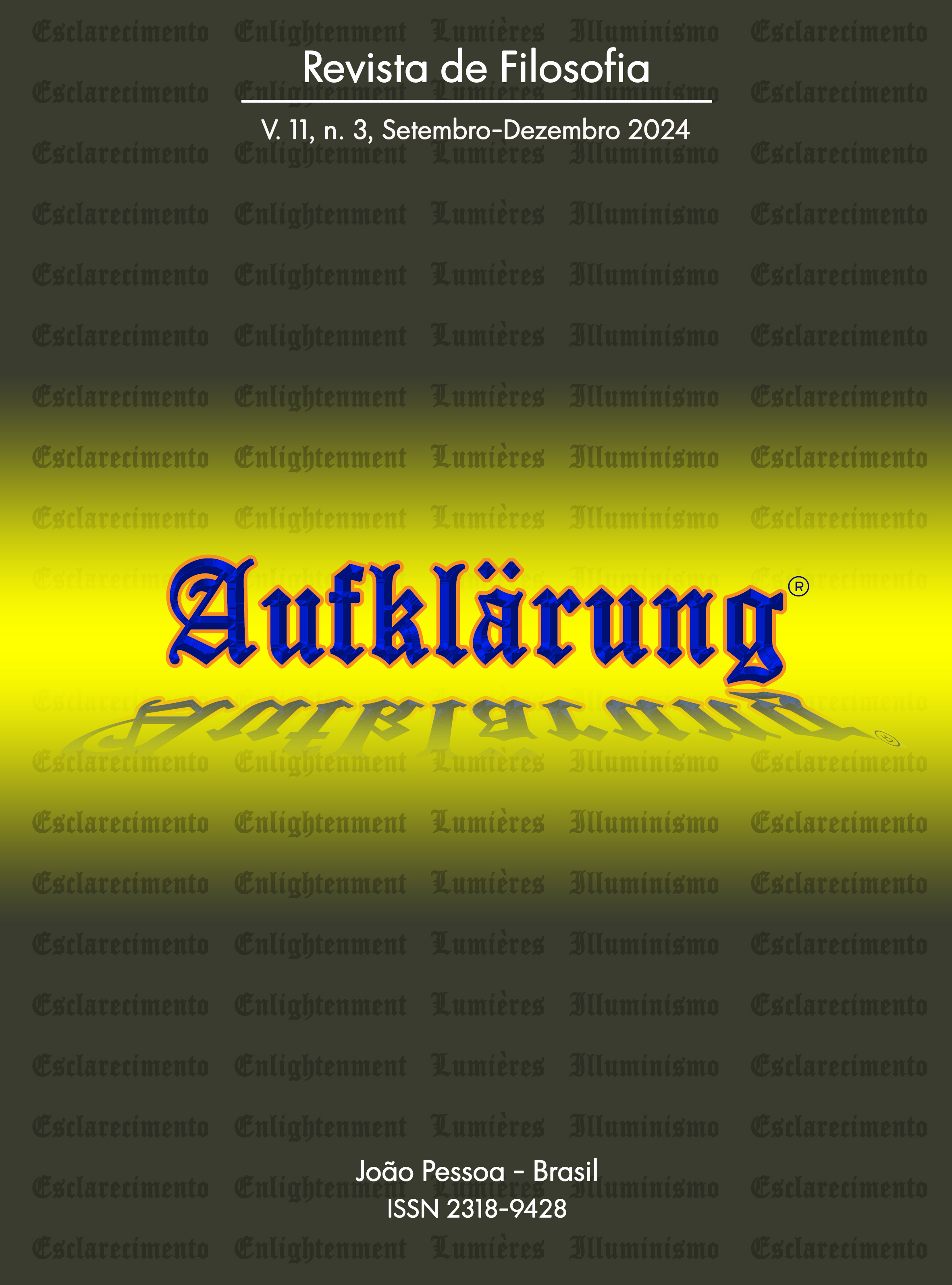The situacionist concept of culture
DOI:
https://doi.org/10.18012/arf.v11i3.69782Keywords:
Culture, Guy Debord, play, Situationist International and spectacle., Culture, Guy Debord, play, Situationist International, spectacleAbstract
This paper aims to present and discuss Guy Debord and the Situationists' conception of culture. In doing so, it is necessary to clear up a few misconceptions from the outset: contrary to appearances, they do not advocate an anti-cultural attitude. Contrariwise, we are at the antipodes of “Neo‑primitivism". When Debord asserts his rejection of contemporary “Neo‑primitivism”, this is akin, in Schillerian language, to rejecting the position of the “savage”, as depicted by Rousseau in his canonical romantic portrait. In the same language, we should also say that Debord rejects the opposite position, that of the "barbarian", who destroys life and sensibility in favour of abstractions.
Downloads
References
REFERÊNCIAS BIBLIOGRÁFICAS
As indicações bibliográficas que o texto contém dizem respeito à data da edição original. Nem sempre tivemos, todavia, a possibilidade de recorrer às edições originais. Nesse caso, a paginação remete o leitor para as edições que constam deste acervo bibliográfico.
ADORNO, Theodor (1970) – Teoria estética. Trad. de Artur Morão. Lisboa: Edições 70, 1988.
DEBORD, Guy (1955a) – “Hurlements en faveur de Sade”. In Œuvres. Ed. de Jean Louis Rançon (com a colaboração de Alice Debord) e introdução de Vincent Kaufmann. Paris: Gallimard, 2006, pp. 61=68.
DEBORD, Guy (1955b) – “L’architecture et le jeu”. In op. cit., pp. 189=191.
DEBORD, Guy (1957a) – “Rapport sur la construction des situations et sur les conditions de l'organisation et de l’action de la tendance situationniste internationale”. In op. cit., pp. 309=328.
DEBORD, Guy (1957b) – “Encore un effort si vous voulez être situationnistes”. In op. cit., pp. 345-350.
DEBORD, Guy (1958a) – “Thèses sur la révolution culturelle”. In op. cit., pp. 360-362.
DEBORD, Guy (1958b) – “Contribution à une définition situationniste du jeu”. In op. cit., pp. 975=976.
DEBORD, Guy (1959) – “Le rôle de “Potlatch”, autrefois et maintenant”. In op. cit., pp. 498=499.
DEBORD, Guy (1960a) – “Préliminaires pour une définition de l’unité du programme révolutionnaire”. In op. cit., pp. 511-518.
DEBORD, Guy (1960b) – “Manifeste (de la IVe Conférence de l’I. S.)”. In op. cit., pp. 529=531.
DEBORD, Guy (1962) – “Les mauvais jours finiront”. In op. cit., pp. 1021-1025.
DEBORD, Guy (1963) – “L’avant-garde de la présence”. In op. cit., pp. 1040=1046.
DEBORD, Guy (1988) – “Commentaires sur la société du spectacle”. In op. cit., pp. 1593=1646.
HUIZINGA, Johan (1938) – Homo Ludens. Trad. de Eugenio Imaz. Madrid: Alianza, 2010.
JEANPIERRE, Laurent (2016) – “La ‘Dialectique de la raison’ situationniste: Guy Debord face à l’essor des sciences de l’homme”. In LE BRAS & GUY, Emmanuel (orgs.), Lire Debord: avec des Notes Inédites de Guy Debord. Paris: L’Échappée, 2016, pp. 401=414.
JAPPE, Anselm (1995) – “Sic transit gloria artis: o ‘fim da arte’ em Theodor W. Adorno e Guy Debord”. In Uma conspiração permanente contra o mundo: reflexões sobre Guy Debord e os situacionistas. Trad. de Jorge Lima Alves. Lisboa: Edições Antígona, 2014, pp. 43=87.
KAUFMANN, Vincent (2001) – Guy Debord. La Révolution au Service de la Poésie. Paris: Fayard.
LEFEBVRE, Henri (1947) – Critique de la vie quotidienne: introduction. Paris: L’Arche, 2009.
LEFEBVRE, Henri (1958) – Avant=propos de la deuxième édition. In op. cit., pp. 9=109.
SCHILLER, Friedrich (1795) – Sobre a educação estética do ser humano numa série de cartas e outros textos. Trad., introdução, comentário e glossário de Teresa Rodrigues Cadete. Lisboa: Imprensa Nacional=Casa da Moeda, 1994.
SCHILLER, Friedrich (1800) – “Sobre os limites necessários no uso de formas belas”. In op. cit., pp. 105=122.
VANEIGEM, Raoul (1967) – Traité de savoir-vivre à l’usage des jeunes générations. Paris: Gallimard, 1992.
Additional Files
Published
How to Cite
Issue
Section
License

This work is licensed under a Creative Commons Attribution 4.0 International License.
Journal general policy
1.This journal works under a Creative Commons License aplied to online journals. That icence can be read in the following link: Creative Commons Attribution 4.0 International (CC BY 4.0).
2.Accordingly to this License, a)the journal declares that authors hold the copyright of their articles without restrictions, and they can archieve them as post-print elsewhere. b)the journal allow the author(s) to retain publishing rights without restrictions.
Metadata Policy for information describing items in the repository
1. Anyone may access the metadata free of charge at anytime.
2.The metadata may be re-used in any medium without prior permission, even commercial purposes provided the OAI Identifier or a link to the original metadata record are given, under the terms of a CC BY license refered for the Journal.







































